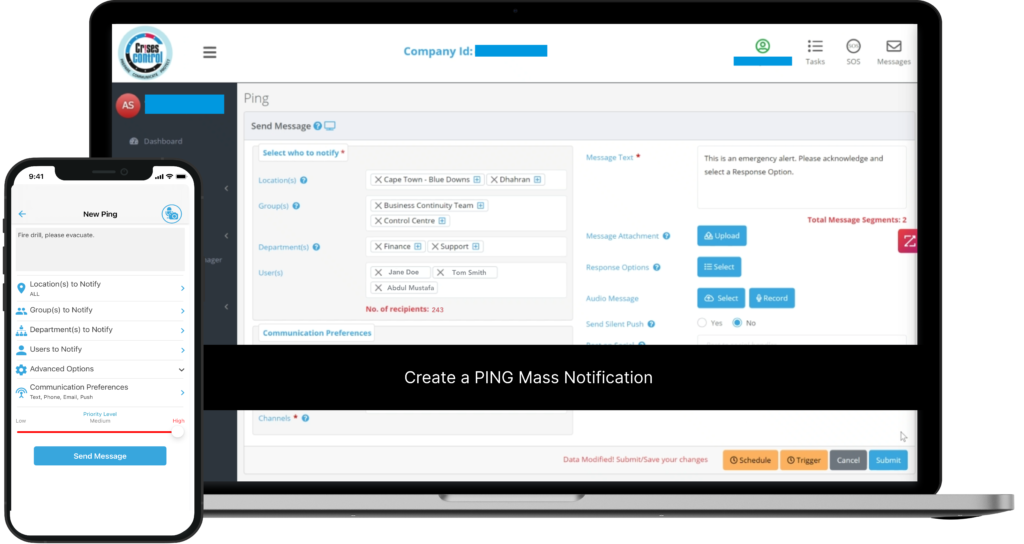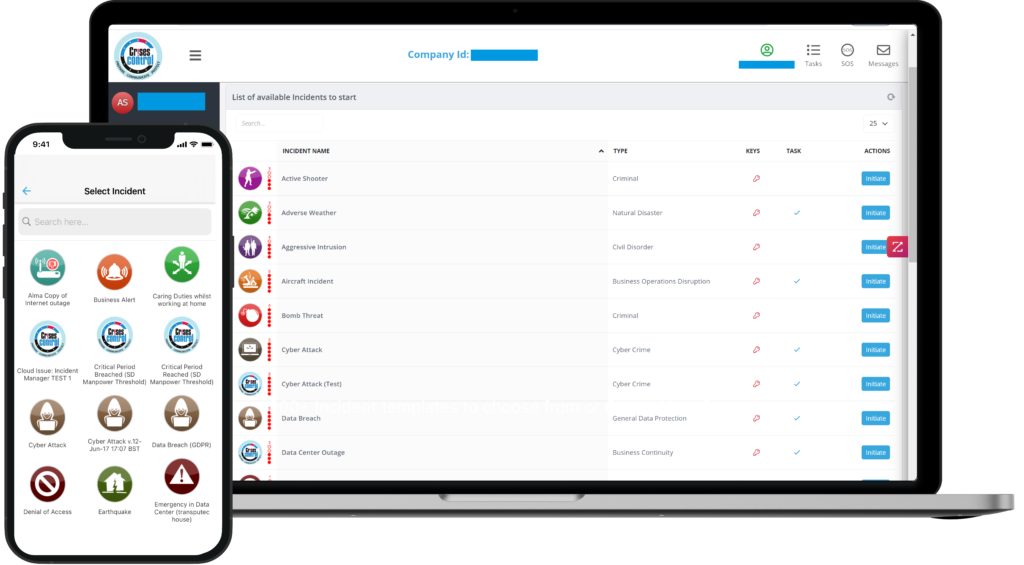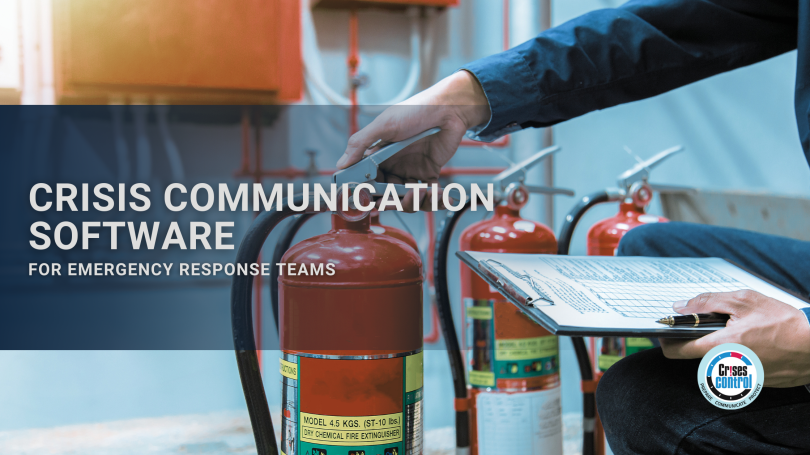Written by Anneri Fourie | Marketing Executive
In critical situations, response time can mean the difference between effective resolution and escalating chaos. Effective communication is essential, allowing emergency responders to act swiftly and efficiently. In today’s fast-paced, high-stakes environment, traditional methods of communication simply don’t cut it. This is where Crisis Communication Software becomes indispensable, enabling teams to coordinate, communicate, and respond with unmatched speed and accuracy.
This blog explores how modern crisis communication software enhances emergency response efforts, why it’s vital for your organisation, and how Crises Control can ensure your team is prepared for any crisis.
Communication Challenges in Emergency Response
When an emergency strikes, communication breakdowns can have devastating consequences. Inadequate or delayed information sharing often leads to confusion, duplication of efforts, and lack of coordination among emergency response teams. Common communication challenges include:
Fragmented Information Flow
Traditional communication methods—like phone calls, emails, or two-way radios—often result in fragmented information. Different teams may receive inconsistent or outdated messages, causing delays and inefficiencies in response efforts.
Lack of Real-Time Updates
Emergencies evolve quickly. Without real-time data, decision-makers must act on incomplete or inaccurate information, hampering response efforts. Imagine a situation where a critical update is sent via email, but some responders don’t see it until minutes later—this can have dire consequences.
Difficulty in Coordinating Multiple Teams
During large-scale emergencies, multiple agencies and teams are often involved. Coordinating these diverse groups can be challenging, especially if communication channels are not centralised. This can lead to missed opportunities for collaboration and the potential for chaotic responses.
These challenges highlight the urgent need for a robust communication framework that ensures real-time updates and seamless collaboration. This is where crisis communication software steps in as a game-changing solution for emergency responders.
How Crisis Communication Software Enhances Emergency Response
Crisis communication software is specifically designed to address the communication challenges faced during emergencies. Here’s how it enhances emergency response efforts:
1. Instant, Multichannel Alerts
In an emergency, speed is of the essence. Crisis communication software allows emergency responders to send out mass notifications instantly through multiple channels, including SMS, email, voice calls, and push notifications. This ensures that everyone receives the same message at the same time, significantly reducing delays and confusion.
For example, Crises Control’s Ping Mass Notification feature enables organisations to broadcast real-time alerts to all team members or selected groups. This means first responders receive critical updates instantly, empowering them to act without hesitation.
2. Centralised Communication and Coordination
Crisis communication software centralises all communication onto a single platform. Emergency teams no longer need to juggle various tools to share updates or coordinate actions. Instead, responders can access a single interface that integrates mass notifications, task management, and incident tracking.
With Crises Control, incident managers can assign tasks, track progress, and monitor the situation in real-time. This promotes greater transparency and accountability, ensuring that all actions are documented and no critical tasks slip through the cracks.
3. Real-Time Data and Situation Awareness
Having access to real-time data is crucial during an emergency. Crisis communication software provides a live view of ongoing incidents, allowing managers and responders to monitor progress, assess risks, and adjust response strategies as needed.
Crises Control’s dashboards deliver real-time visualisations of the situation as it unfolds. Decision-makers can view updates from multiple teams, ensuring everyone stays informed and proactive throughout the crisis.
4. Task Management and Workflow Automation
Effective emergency response involves coordinating multiple tasks across various teams. Crisis communication software automates task assignments and outlines a clear workflow for each stage of the response. This minimises human error and guarantees timely completion of every task.
For instance, Crises Control’s Task Manager allows incident managers to assign tasks with deadlines and monitor their completion in real-time. Automated reminders help responders stay on track, and task updates are instantly visible to everyone involved, streamlining the response process.
5. Mobile Accessibility for On-the-Go Responders
Emergency responders often need to act in the field, making mobility essential. Crisis communication software ensures that critical communication tools are available even when responders are away from their desks. Mobile apps provide full access to notifications, incident dashboards, and task management features, allowing responders to stay informed and in control, regardless of their location.
Crises Control’s mobile app ensures responders can receive notifications, update tasks, and access critical information from anywhere—even if other systems are down or unavailable. This guarantees continuity in communications, even during the most challenging situations.
Interested in our Ping Mass Notification Software?
Efficiently alert everyone in seconds at scale with our Mass Notification System – PING, get the message out fast and ensure rapid response and recovery.

The Importance of Crisis Communication Software for Emergency Responders
Effective communication during a crisis is not merely a matter of convenience; it’s a matter of safety. Crisis communication software for emergency responders ensures that critical messages are delivered quickly and accurately, reducing the risk of misunderstandings or delays.
Key Benefits of Crisis Communication Software
- Improved Response Times: By streamlining communication and automating workflows, response teams can act faster, reducing the potential for harm.
- Better Coordination Across Teams: Crisis communication software creates a single source of truth for all emergency-related communications, allowing for enhanced coordination between teams.
- Enhanced Decision-Making: Real-time data and updates empower managers to make informed decisions quickly, improving overall response outcomes.
- Minimised Human Error: Automation of tasks and reminders decreases the likelihood of human error, ensuring that every aspect of the emergency is addressed promptly.
How Crises Control Enhances Crisis Communication for Emergency Responders
Crises Control is a leading provider of crisis communication and emergency management solutions, specifically designed to empower emergency responders. Our platform boasts a range of features that enhance communication, coordination, and response capabilities during critical situations:
1. Ping Mass Notification
Our Ping Mass Notification system allows organisations to send real-time alerts to employees, responders, or predefined groups. Notifications can be disseminated across multiple channels, ensuring messages are delivered swiftly and effectively.
2. Incident Manager
Crises Control’s incident management feature enables responders to manage crises in real-time. It provides a centralised platform for monitoring the situation, assigning tasks, and tracking the status of each response activity.
3. Task Manager
The Task Manager helps incident managers assign tasks to responders and monitor their progress in real-time. This ensures that all aspects of the response are handled efficiently, without any gaps.
4. SOS Panic Button
The SOS Panic Button enables individuals to alert emergency response teams instantly, ensuring rapid response when needed. This feature is particularly useful for responders in the field who may require immediate assistance.
5. Mobile App
Our mobile app allows responders to access the full range of Crises Control features on the go. Even during system outages, the app ensures that emergency teams can communicate and coordinate seamlessly.

Interested in our Incident Management Software?
Customise your Crisis Incident Management Software to meet your specific needs with our flexible tools & stay connected and informed during the crisis and incident management process
Conclusion: Ensure Your Team is Prepared with Crises Control
In an emergency, your organisation needs more than just a response plan—it needs the right tools to communicate and act quickly. Crisis communication software is essential for emergency responders, enabling real-time information sharing, task management, and seamless coordination. By using Crises Control, you can ensure your team is ready to face any crisis with confidence.
Don’t wait for the next emergency to highlight your organisation’s communication weaknesses. Take proactive steps now to enhance your crisis communication capabilities. Contact us today for a free personalised demo of Crises Control and discover how our platform can revolutionise your emergency response efforts.
Request a FREE Demo

